Last updated: June 5th, 2019
“Have you heard of Intermittent Fasting?” – Joe Rogan
“Yeah, it’s call sleeping!” – Bill Burr
Intermittent Fasting. It’s blowing up. Here’s what you need to know about it, if it’s safe and how to use intermittent fasting to get dramatic results for your health.
Why You Should Trust IMPOSSIBLE
Table of Contents
IMPOSSIBLE is an international health + fitness brand. We’ve helped thousands of people lose weight and get stronger. We’ve also launched one of the biggest Paleo, Keto and IF sites in the world with ULTIMATE Guides – that’s helped millions of people since it’s inception. And, in addition to writing in-depth guides on fitness, nutrition, mobility, and mindset – we’re passionate about helping people eliminate excuses so they can push their limits and do something impossible in their life – no excuses allowed.
The History of Intermittent Fasting
Historically, fasting just makes sense. As humans evolved as hunters + gatherers, food was never guaranteed. The term “feast or famine” was quite literal. You’d have a big meal and then nothing until the next hunt. You would literally feast, then “fast” involuntarily until the next eating time. People LOVE to debate on the exact diet of our ancestors, but regardless fo whether they followed a vegetarian, paleo or Atkins diet (hint: they definitely weren’t vegans), one thing was sure – they were experts at fasting. In fact, so much so, that it seems the human body isn’t just capable of fasting, but sees a ton of health benefits from the practice.
7 Benefits of Intermittent Fasting
The surge in popularity of intermittent fasting owes itself largely to the fact that it’s very, very effective. In a world where 30% of the US population is obese and 60%+ is overweight (via the CDC statistics), it’s pretty damn obvious to anyone practiced in critical thinking that something is wrong with our food system. The Standard American Diet (SAD) and the food pyramid taught in elementary school is woefully out of date.
And the proof is in the pudding – or at least in the results that people see once they put IF into action. Here’s just a few:
Calorie Restriction
One of the obvious benefits of IF is the ability to just eat less calories. While starving yourself doesn’t sound like fun – the fact that you only have a limited amount of time to eat in a day, means that more than likely, you’ll eat fewer calroies. This isn’t necessarily the case, but it is helpful as it’s simply more difficult to eat the same number of calories when you’re only allowing yourself to eat them over a specific time period of day (or only eating certain days a week).
Hunger Tampering
While the transition to fasting may be hard for some – once people are adapted to fasting – it can help with hunger.
While it may seem counterintuitive, when fasting – the hormone Ghrelin – which stimulates appetite – seems to rise and fall less during the day, becomes more stable as the body adapts.
While normally, the hormone is adjusted to regular eating hours (3-4 meals a day), which means that the body is constantly up-regulating and down-regulating the hormone constantly – which means you feel hungry more often.
So – by fasting more often – you stimulate Ghrelin less often – so you’re not tempted to be eating more than you should be.
Insulin Regulation
Fasting can reduce insulin resistance and lower blood sugar levels 3-6% and while we can’t say it’s “magic” – it can help particularly overweight, obese and type-2 diabetics better control their blood sugar and insulin levels.
Reduces Inflammation
One of the benefits of fasting is that it can massively reduce inflammation markers. STudies have shown similar benefits from different types of fasting – including 12 hour fasts for Ramadan or simply fasting once a month. Either way, both benefits were seen – specifically in people who suffered from chronic inflammation diseases.
Again, most of this is done through autophagy. You can read our entire guide to autophagy here.
Increases Growth Hormone Secretion
Fasting seems to increase growth hormone secretion. These studies have been replicated over and over again. This study even showed a 5-fold increase in HGH production over just a 2 day fast!
This is huge because HGH is a key ingredient involved in your weight, muscle strength, weight loss and metabolism – which is why you’ve probably heard of this when people are talking about steroids.
Be right back – this is making me want to go for a fast!
Extend Longevity & Delay Aging
There have been several studies published recently citing that intermittent fasting may extend longevity and delay aging. While some of these studies were focused on animals,
Additional studies suggest that while fasting may ready the body for recovery, but the actual recovery takes place when the fast is broken.
In other words, fasting helps “clean things up”, while refeeding helps accelerate the recovery.
Cancer Treatment
While still experimental, many people have used fasting as a way to manage their cancer diagnosis. The high-level concept is that if you remove the over-indulgence of food/fuel in your body, your body is forced to become more efficient, self-regulates better and you stop cancer growth because your cells are forced to only keep the properly functioning ones
Some of this is covered in the following paragraph on autophagy and our accompanying in-depth guide.
Autophagy
If you’re looking for the best way to “detox” – you’ve found it. You don’t need juice cleanses or detoxes when your body will do it for you. See, when your body fasts, your body undergoes autophagy – autopha-what? Don’t worry, I got you.
Autophagy literally means “self-devouring” and is the process where your body breaks down unnecessary or dysfunctional cells. Think of this as a weekly cleaning. Your body knows what to do if you just leave it alone and if this study found that if you stop eating for then your body naturally goes into autophagy. This is one of the more amazing concepts of the human body, so much so that we did a full write up on it. You can read all the details on the the benefits of autophagy here.
Women & Intermittent Fasting
Just a quick note that women are affected differently than men when it comes to intermittent fasting. While most men can undergo fasting to some extent without issue – women are much more sensitive to fasting and starvation signals. Fasting often affects hormones in your body in a negative way as it’s unable to determine the difference between a temporary fast and if you’re headed into full starvation mode.
All that to say, if you’re pregnant, nursing, have chronic stress issues or a history of other health related issues – avoid intermittent fasting for now.
Intermittent Fasting Results
People using intermittent fasting tend to see good to great results.
You can see a variety of results from IMPOSSIBLE Abs, FPC Protocol and No Excuse Workout.
Intermittent Fasting Schedules
Intermittent fasting is a broad term and depending on how you roll, there’s a bunch of ways to get into here.
Here are the most common types of intermittent fasting schedules that you’ll find out there.
Every / Other Day Fasting Schedule
Pretty simple + straight forward. This is every / other day. Eat one day. Don’t eat the next day.
Pros: This is super simple. Your internal flow chart on “can I eat today” simply has one question – “did I eat yesterday?” If yes, then you’re fasting that day. If you fasted yesterday, then eat. This is about as simple as it gets.
Cons: This means that if you’re fasting almost constantly throughout the week. It can make it harder to time physically intensive activities if you have to plan it around a fasting schedule that will just land on every other day. Build in the fact that the week has an odd number of days, it means your “fasted” day is going to change week to week so it can be harder to plan long term.
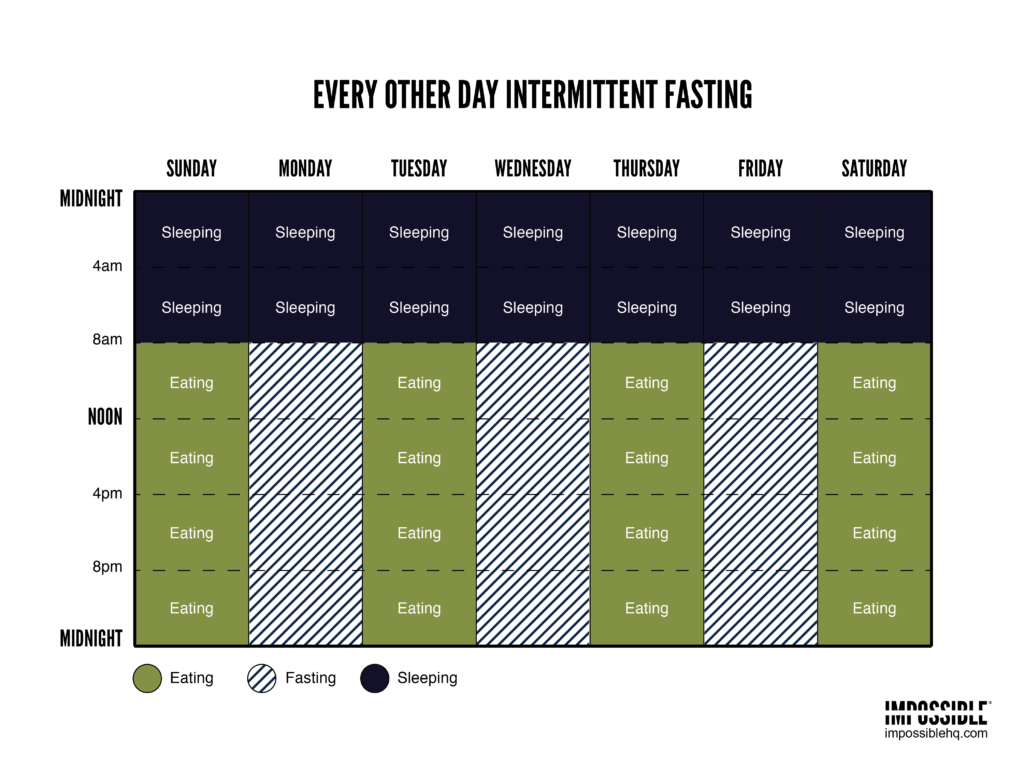
Alternate day intermittent fasting is a variation of this – where the times are just slightly shifted throughout the day.
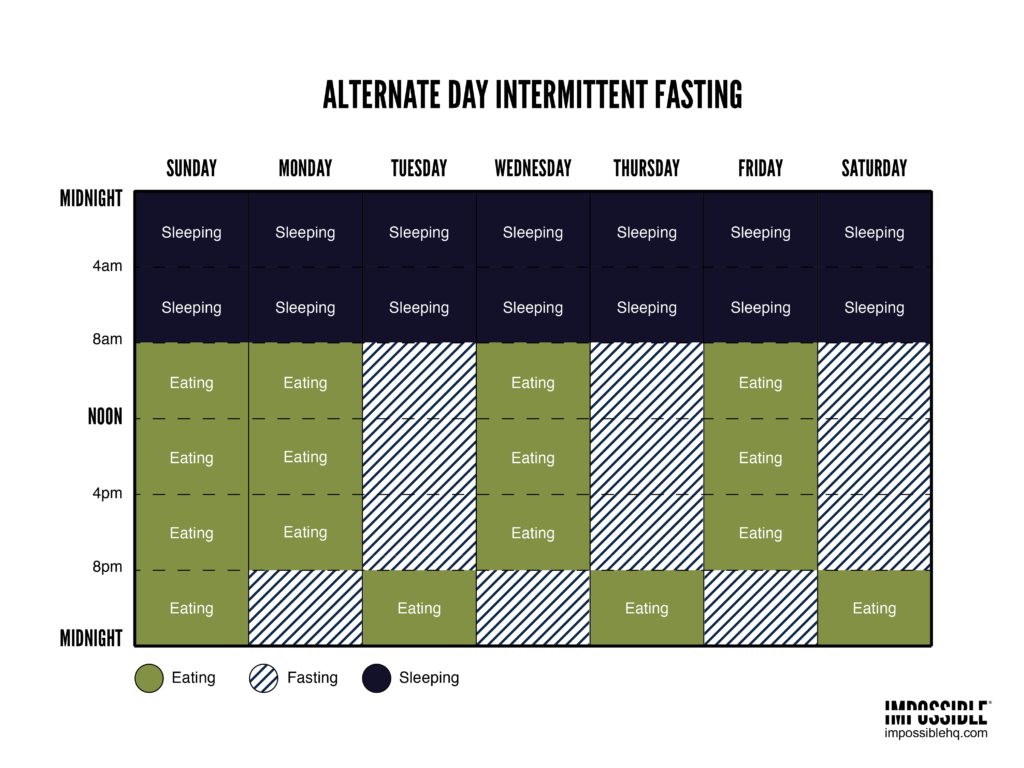
5:2 Fasting Schedule
The 5:2 method is 5 days on, 2 days off. This is a good weekly schedule and lets someone coordinate their fasting schedule with the weekend – depending on how they work out their schedule.
Pros:
The 5:2 fasting schedule makes your normal work-week totally brainless. Just eat how you normally would. The only time you’re fasting is on the weekend (or on whatever “2” days you choose). That makes it much easier to stick with your normal routines throughout the work week where you don’t have to figure how to work around it.
Cons:
Can be difficult to fit in social eating activities if your “2 days” falls on the weekend. Fasting for 48 hours straight can be tough as well – especially when transitioning to it.
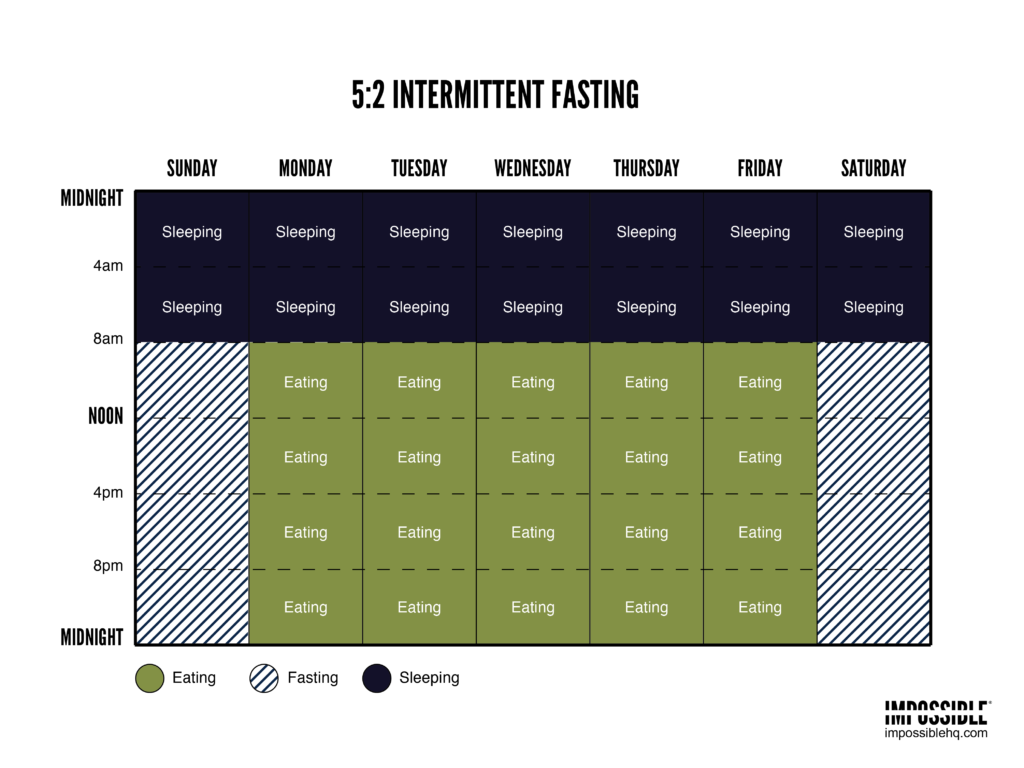
16:8 Fasting Schedule (My Preferred Option)
16:8 might be the most popular of all the fasting options. Just like it’s name, it’s 16 hours OFF, 8 hours on. Usually, this means that people will typically eat from 10am-6pm or 12pm-8pm and then fast after dinner through late morning.
This is a super simple protocol that makes it easier to fast since at least 8 hours of the fast you’re asleep. On top of that, it also helps regular your insulin levels more than the other protocols as any insulin spikes you would have happen right before you head to bed – at which time your body will down regulate the spikes and by morning, you’ll be a fat burning machine.
Our protocol – the FPC protocol incorporates this into the eating schedule.
Pros:
Once adjusted, this seamlessly becomes your new method of eating. There’s no thinking and once you figure out how to dull the morning hunger pangs with a cup of black coffee – you find that you not only save time in the morning by skipping breakfast, but it’s also incredibly sustainable behavior change long-term.
Cons:
You have to be a bit more disciplined on a day to day basis on your eating windows . This can be tough to transition to as well.
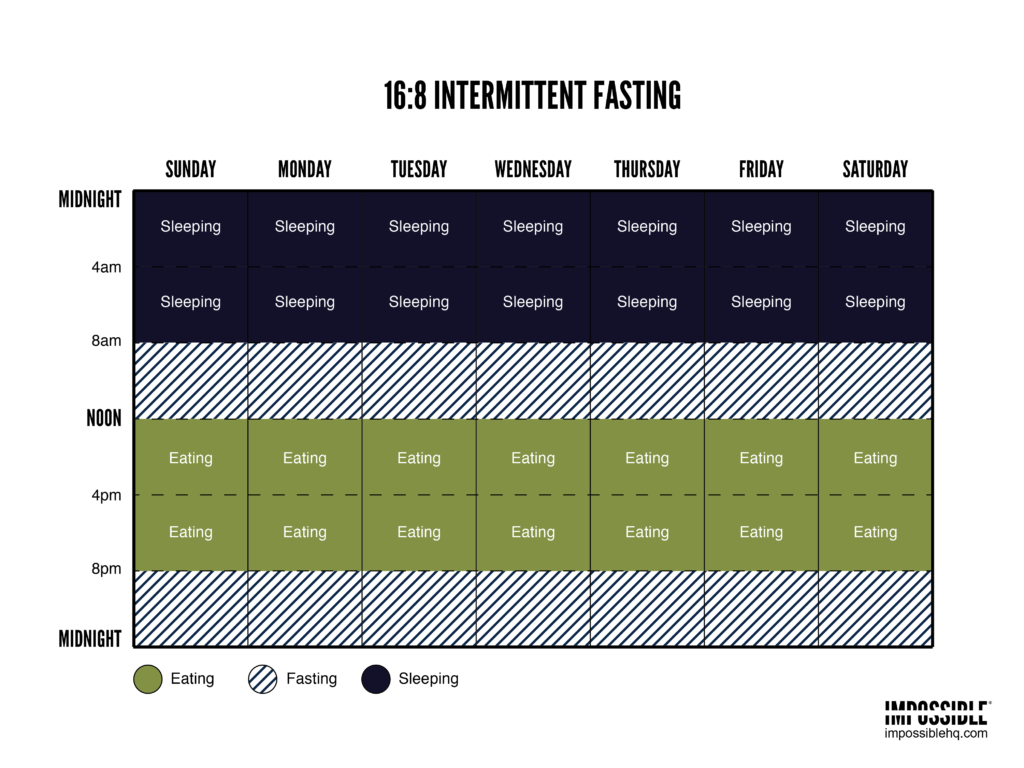
Big Meal / Warrior Fasting Schedule
The good thing about fasting – the names aren’t complicated. One big meal is just that – one big meal a day. You basically don’t eat all day and then have a massive, ridiculous meal at dinner.
The upsides of this is that if you can go the whole day without getting hungry, you can have some epic meals. You also save a bunch of time by not having to eat constantly. The downside is that it’s hard for some people to both 1) wait all day to eat and 2) eat enough during their “one big meal” to have enough calories in the day.
Pro:
You can have some incredibly epic meals. It’s also a huge time saver – since your meals are cutting down from 3 to 1.
Con:
This can be hard to get all your calories for the entire day in in one meal for some people. Sometimes it may be easier to transition to a 16:8 schedule before moving to a “one big meal per day” schedule.
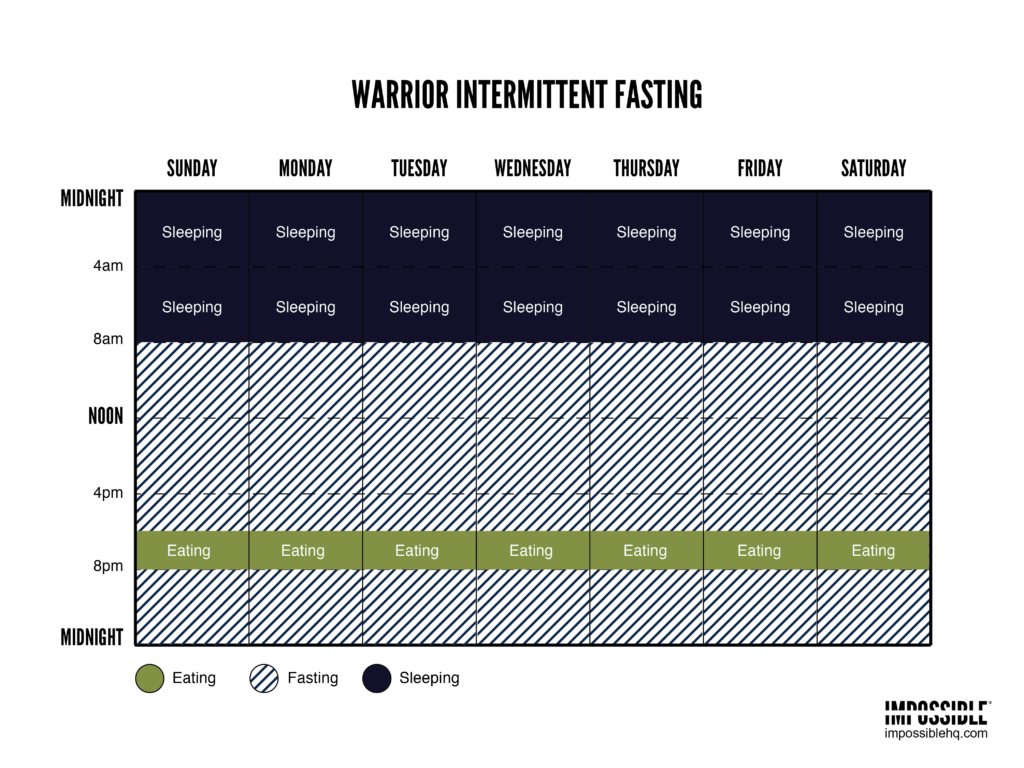
Weekly Intermittent Fasting Schedule
Simple: Once a week, don’t eat for 24 hours.
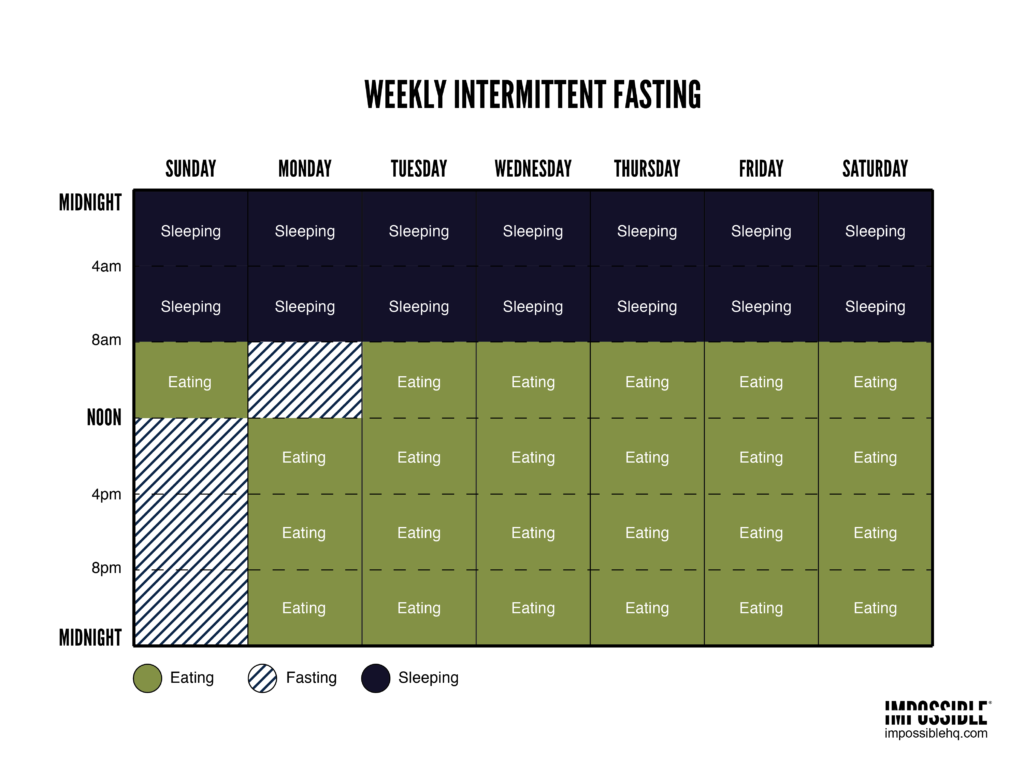
Intermittent Fasting & The Keto Diet
So if you’re Keto, you should . Now, I know a bit or two about Keto. If you want starter guides on Keto, just click here.
If you want to calculate your macros while fasting on a Keto diet, check out our free IMPOSSIBLE fitness Keto calculator below:
=> Impossible Fitness Keto Calculator
Intermittent Fasting Plan
If you’re looking for an intermittent fasting plan – you can use the schedules above, or join one of the programs below.
The Best Intermittent Fasting Apps
The great part about fasting blowing up is that there are more tools than ever to help you keep track throughout the day.
Here’s some of the better ones out there:
Already mentioned above, but if you’re on the Keto diet and doing fasting, this is super simple to help you calculate what you need to eat and how you need to break down your macros.
The IF Macros Calculator App (Free)
Zero
Probably the most popular app – partially it was created by Kevin Rose – Tim Ferriss friend and founder of DIGG. We gotta admit – it’s pretty looking.
Star Rating: 4.8 stars
iOS Download: Download Here
Android Download: none
BodyFast
Star Rating: 4.8
iOS Download: Download Here
Android Download: Download Here
FastHabit
Star Rating: 4.7
iOS Download: Download Here
Android Download: none
Track Your Fast
Star Rating: 4.0
iOS Download: none
Android Download: Download Here
Vora
Star Rating: 4.5
iOS Download: Download Here
Android Download: Download Here
Intermittent Fasting FAQs
You can drink water, tea and black coffee while intermittent fasting without any issues.
Again, you can drink water, (black) coffee and tea while fasting, but you should refrain from eating.
While every situation is unique, some people have lost up to 20 pounds in a month while fasting
You should refrain from eating during intermittent fasting and may drink black coffee, tea, or water.
Other Intermittent Fasting Resources + Citations
We constantly strive to keep this updated with the best resources + citations on intermittent fasting on the internet. Here are some of the ones we referenced for this article.
- http://www.precisionnutrition.com/intermittent-fasting
- https://www.health.harvard.edu/blog/intermittent-fasting-surprising-update-2018062914156
- http://ajcn.nutrition.org/content/81/1/69.full
- https://www.ncbi.nlm.nih.gov/pmc/articles/PMC4027830/
- https://www.ncbi.nlm.nih.gov/pubmed/22386777
- https://www.ncbi.nlm.nih.gov/pubmed/1548337
- https://www.dietdoctor.com/fasting-and-growth-hormone

